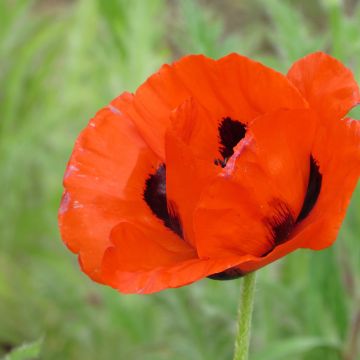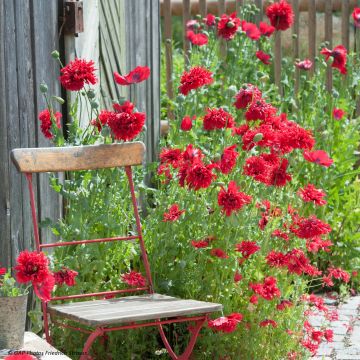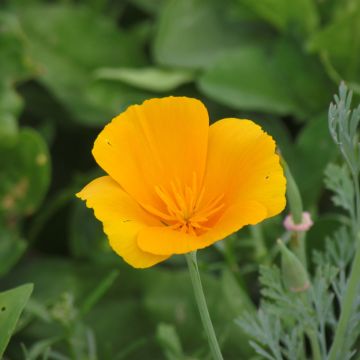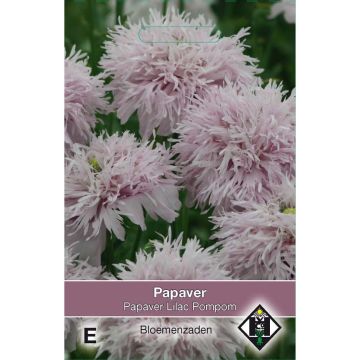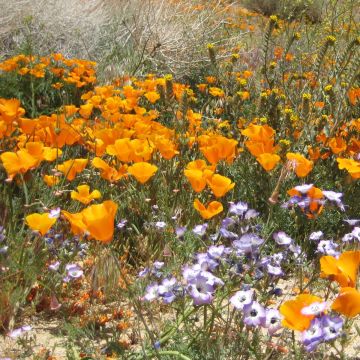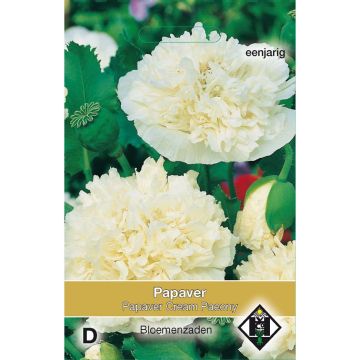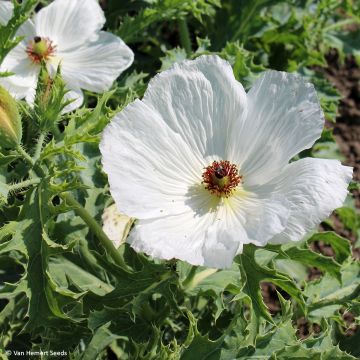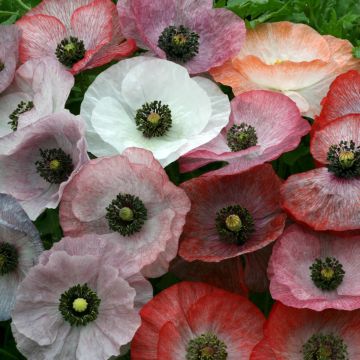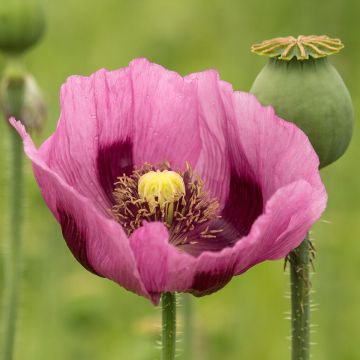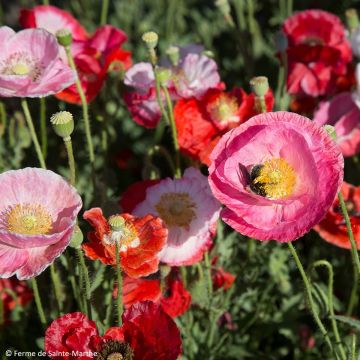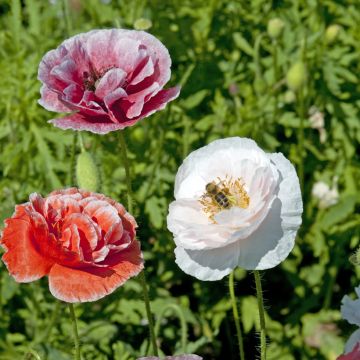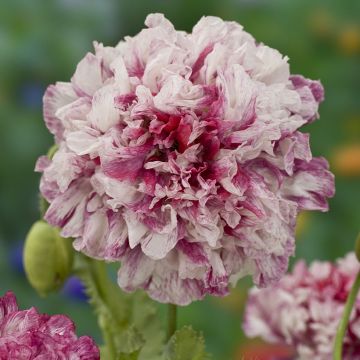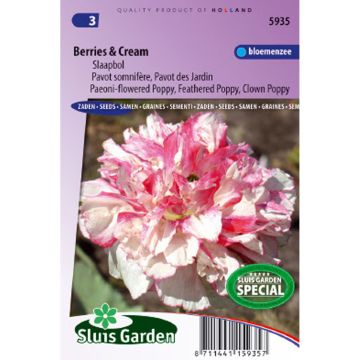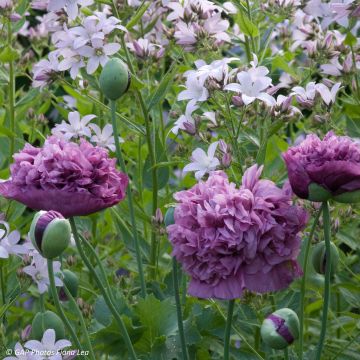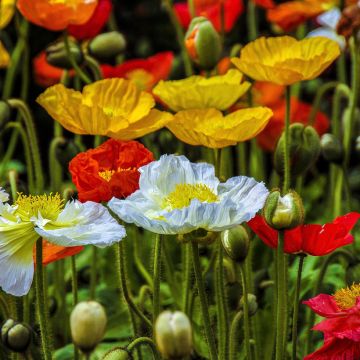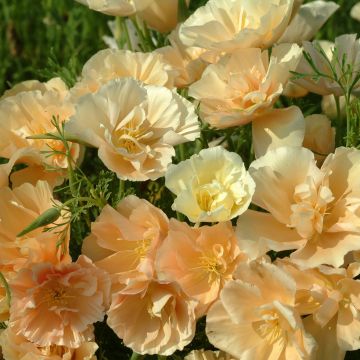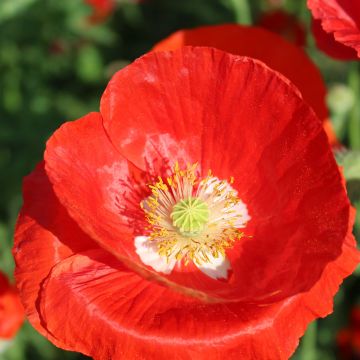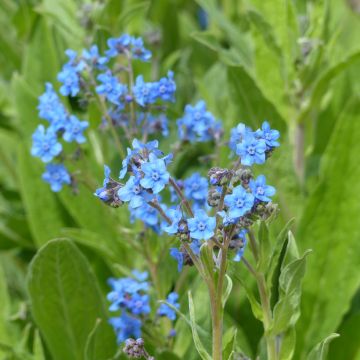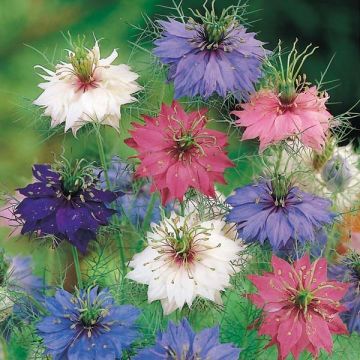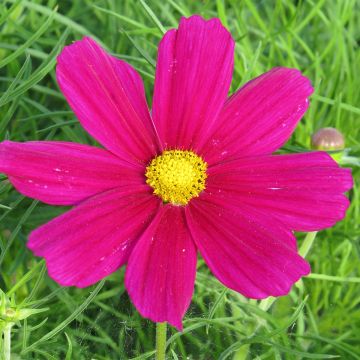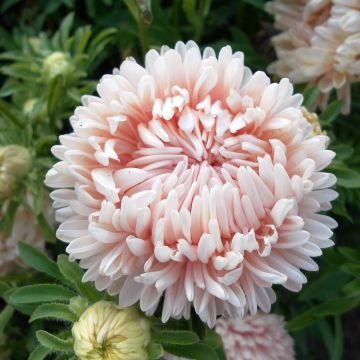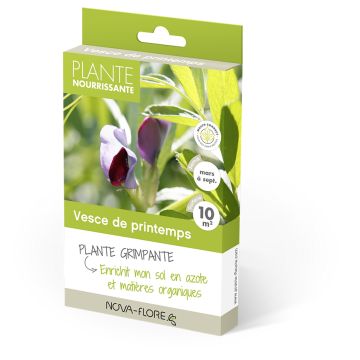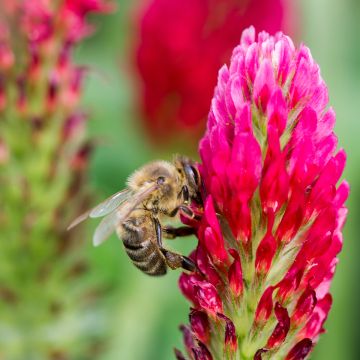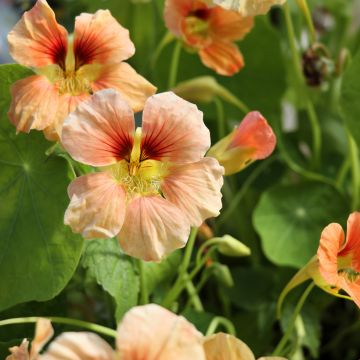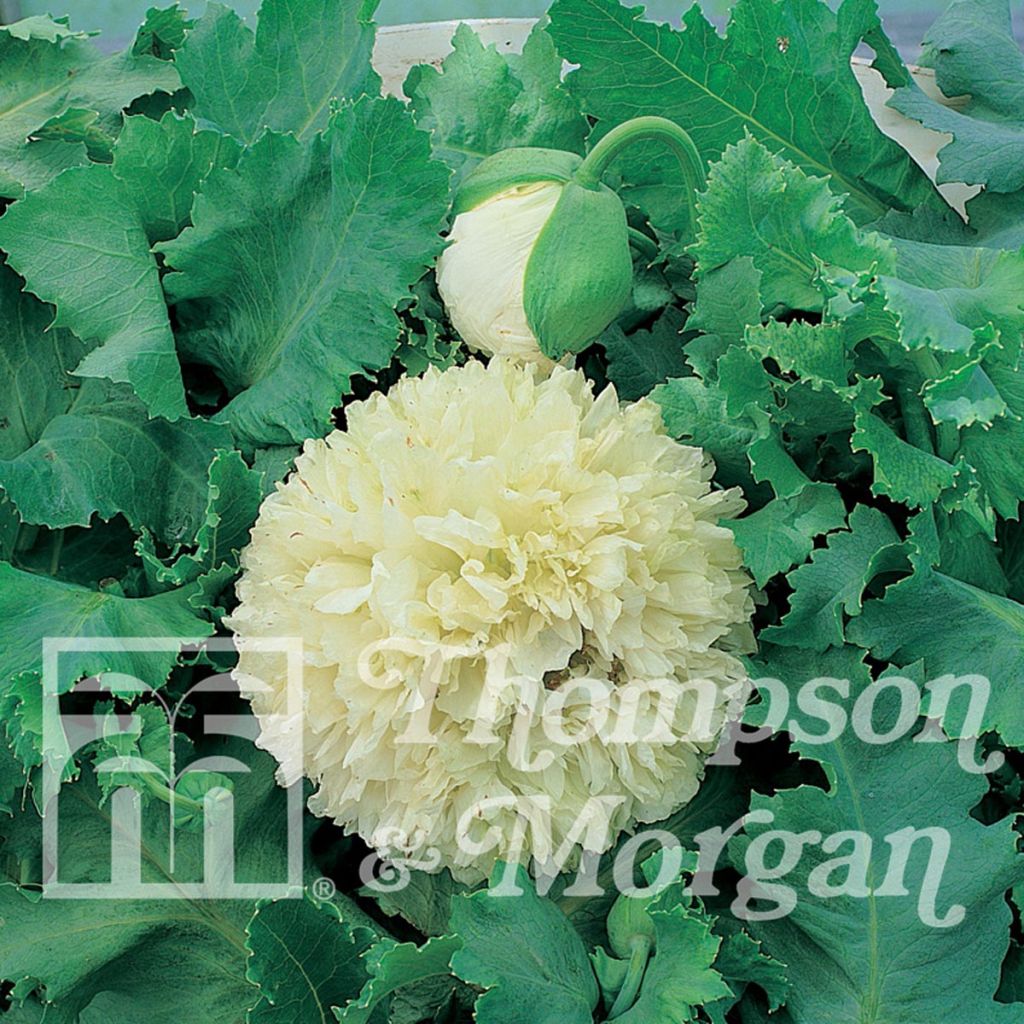

Pavot Applegreen
Papaver somniferum Applegreen
Papaver somniferum var.nigrum Applegreen
Opium Poppy, Black Poppy
I will need to sow the seeds and be able to assess their development.
Eliane LIRAUD, 27/06/2016
Special offer!
Receive a €20 voucher for any order over €90 (excluding delivery costs, credit notes, and plastic-free options)!
1- Add your favorite plants to your cart.
2- Once you have reached €90, confirm your order (you can even choose the delivery date!).
3- As soon as your order is shipped, you will receive an email containing your voucher code, valid for 3 months (90 days).
Your voucher is unique and can only be used once, for any order with a minimum value of €20, excluding delivery costs.
Can be combined with other current offers, non-divisible and non-refundable.
Why not try an alternative variety in stock?
View all →This plant carries a 6 months recovery warranty
More information
We guarantee the quality of our plants for a full growing cycle, and will replace at our expense any plant that fails to recover under normal climatic and planting conditions.
Would this plant suit my garden?
Set up your Plantfit profile →
Description
The Sleep-inducing Poppy or Papaver somniferum 'Applegreen' is a strange and fascinating annual poppy, displaying large and subtly unusual pompom flowers all summer in light green and creamy white colours above beautiful silver-green foliage. Very ornamental fruits follow, which are helpful in dried bouquets. This easy-to-sow and cultivate plant looks stunning when planted en masse along pathways or in flower borders. It thrives in well-worked, light soil in full sunlight.
The annual poppy 'Applegreen' is a recent and original horticultural variety discovered by chance in an English amateur gardener's garden. It comes from Papaver somniferum var. nigrum, found in Asian mountains and Europe on the limestone soils frequented by poppies. This plant, probably originating from the Mediterranean and Asia Minor regions, has given birth to many long-cultivated varieties for ornamental purposes. 'Applegreen' has magnificent silver-blueish foliage, with beautiful lobed and elliptical leaves displaying a notched edge. From this 30 to 40 cm (12 to 16in) wide foliage clump, tall stems rise from June to August, bearing sumptuous solitary flowers at 90 cm (35in) above the ground. The numerous petals that compose them are tightly packed and pleated like silky fabric to the centre of the flower. They are light apple green in the centre, appearing more cream-coloured at the petal tips. Like poppies, The flower's centre is adorned with a bouquet of black stamens around a yellow disc that only becomes visible as the flower fades. The flowering gives way to a characteristic fruit filled with tiny black seeds, very ornamental, which takes on slate blue reflections when dried, changing with the light due to the crystallised wax film that protects it. Sleep-inducing poppies have a taproot that does not tolerate transplantation well, so it is preferable to sow them in place.
At home in sophisticated gardens, sleep-inducing poppies allow for the rapid and effortless creation of oceans of infinitely delicate flowers, moving in their bright, dark, or pastel colours, dancing on the silver foam of their foliage. While not very long-lasting in bouquets, the 'Applegreen' Poppy flowers have an enchanting charm when planted en masse, in front of large daisies or the swaying foliage of grasses. This annual plant, like cosmos, is unparalleled in filling the empty spaces between annuals or large late-flowering perennials such as sunflowers, which take over in full sunlight.
Once the flowering is exhausted, there are still the fruits, valuable for dried bouquets and the poppy straw, in slightly wild areas, often seen as a majestic element of the garden or a somewhat enigmatic vestige of summer.
Report an error about the product description
Flowering
Foliage
Plant habit
Botanical data
Papaver
somniferum var.nigrum
Applegreen
Papaveraceae
Opium Poppy, Black Poppy
Cultivar or hybrid
Other Poppy seeds
View all →Planting and care
Sow Poppy 'Applegreen' annual seeds directly outdoors in spring or autumn. Choose a sunny spot with fertile, well-drained soil thoroughly loosened beforehand. Sow the fine seeds just below the surface of the soil. Water regularly, especially during dry periods. Germination usually takes 7 to 14 days. When the young poppy plants are large enough to handle, space them 30cm (12in) apart. Garden poppies should not lack water or nutrients in summer. Opium poppies easily self-seed in the garden. Remove faded flowers if you want to prevent spontaneous seedlings. Although annual poppies prefer light and loamy soils, they are undemanding plants that can adapt to most well-worked soils. Their seeds retain their viability for a long time, and it is not uncommon to see seedlings emerge years after a 'failed' sowing following soil cultivation. Important note: all poppies are toxic. However, the seeds produced by P. somniferum and P. paeoniflorum can be consumed. Generally, the seeds are used in bakery recipes (bread, brioche, etc.).
Sowing period
Intended location
-
, onOrder confirmed
Reply from on Promesse de fleurs
Similar products
Haven't found what you were looking for?
Hardiness is the lowest winter temperature a plant can endure without suffering serious damage or even dying. However, hardiness is affected by location (a sheltered area, such as a patio), protection (winter cover) and soil type (hardiness is improved by well-drained soil).

Photo Sharing Terms & Conditions
In order to encourage gardeners to interact and share their experiences, Promesse de fleurs offers various media enabling content to be uploaded onto its Site - in particular via the ‘Photo sharing’ module.
The User agrees to refrain from:
- Posting any content that is illegal, prejudicial, insulting, racist, inciteful to hatred, revisionist, contrary to public decency, that infringes on privacy or on the privacy rights of third parties, in particular the publicity rights of persons and goods, intellectual property rights, or the right to privacy.
- Submitting content on behalf of a third party;
- Impersonate the identity of a third party and/or publish any personal information about a third party;
In general, the User undertakes to refrain from any unethical behaviour.
All Content (in particular text, comments, files, images, photos, videos, creative works, etc.), which may be subject to property or intellectual property rights, image or other private rights, shall remain the property of the User, subject to the limited rights granted by the terms of the licence granted by Promesse de fleurs as stated below. Users are at liberty to publish or not to publish such Content on the Site, notably via the ‘Photo Sharing’ facility, and accept that this Content shall be made public and freely accessible, notably on the Internet.
Users further acknowledge, undertake to have ,and guarantee that they hold all necessary rights and permissions to publish such material on the Site, in particular with regard to the legislation in force pertaining to any privacy, property, intellectual property, image, or contractual rights, or rights of any other nature. By publishing such Content on the Site, Users acknowledge accepting full liability as publishers of the Content within the meaning of the law, and grant Promesse de fleurs, free of charge, an inclusive, worldwide licence for the said Content for the entire duration of its publication, including all reproduction, representation, up/downloading, displaying, performing, transmission, and storage rights.
Users also grant permission for their name to be linked to the Content and accept that this link may not always be made available.
By engaging in posting material, Users consent to their Content becoming automatically accessible on the Internet, in particular on other sites and/or blogs and/or web pages of the Promesse de fleurs site, including in particular social pages and the Promesse de fleurs catalogue.
Users may secure the removal of entrusted content free of charge by issuing a simple request via our contact form.
The flowering period indicated on our website applies to countries and regions located in USDA zone 8 (France, the United Kingdom, Ireland, the Netherlands, etc.)
It will vary according to where you live:
- In zones 9 to 10 (Italy, Spain, Greece, etc.), flowering will occur about 2 to 4 weeks earlier.
- In zones 6 to 7 (Germany, Poland, Slovenia, and lower mountainous regions), flowering will be delayed by 2 to 3 weeks.
- In zone 5 (Central Europe, Scandinavia), blooming will be delayed by 3 to 5 weeks.
In temperate climates, pruning of spring-flowering shrubs (forsythia, spireas, etc.) should be done just after flowering.
Pruning of summer-flowering shrubs (Indian Lilac, Perovskia, etc.) can be done in winter or spring.
In cold regions as well as with frost-sensitive plants, avoid pruning too early when severe frosts may still occur.
The planting period indicated on our website applies to countries and regions located in USDA zone 8 (France, United Kingdom, Ireland, Netherlands).
It will vary according to where you live:
- In Mediterranean zones (Marseille, Madrid, Milan, etc.), autumn and winter are the best planting periods.
- In continental zones (Strasbourg, Munich, Vienna, etc.), delay planting by 2 to 3 weeks in spring and bring it forward by 2 to 4 weeks in autumn.
- In mountainous regions (the Alps, Pyrenees, Carpathians, etc.), it is best to plant in late spring (May-June) or late summer (August-September).
The harvesting period indicated on our website applies to countries and regions in USDA zone 8 (France, England, Ireland, the Netherlands).
In colder areas (Scandinavia, Poland, Austria...) fruit and vegetable harvests are likely to be delayed by 3-4 weeks.
In warmer areas (Italy, Spain, Greece, etc.), harvesting will probably take place earlier, depending on weather conditions.
The sowing periods indicated on our website apply to countries and regions within USDA Zone 8 (France, UK, Ireland, Netherlands).
In colder areas (Scandinavia, Poland, Austria...), delay any outdoor sowing by 3-4 weeks, or sow under glass.
In warmer climes (Italy, Spain, Greece, etc.), bring outdoor sowing forward by a few weeks.






























